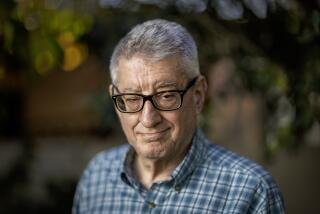Ex-Colorado Professor Feels the Sting of McCarthyism, Betrayal
- Share via
BOULDER, Colo. — During the height of the 1950s Red Scare, University of Colorado philosophy professor Morris Judd was fired amid rumors that he was a communist. He never worked in education again.
Half a century later, Judd, 86, has learned that the man responsible was Robert Stearns, then the university’s president, who spied on his faculty for the FBI, according to newly declassified documents.
In a telephone interview from his home in Sun City, Ariz., Judd said he’ll never forgive Stearns.
“He was responsible for my leaving teaching,” Judd said. “He attacked me personally, saying I was a dull teacher, then that I was incompetent, all the while because there were rumors that I was a radical and a communist.”
Judd refuses to say whether he belonged to the party.
Stearns died in 1977, and his relatives declined comment.
At the height of McCarthyism in the early 1950s, it was not unusual to see allegations of political disloyalty without evidence to accompany them, said Ellen Schrecker, who studies the era of Sen. Joseph McCarthy’s hunt for communist sympathizers.
“We seem to be discovering that this kind of thing was going on at several campuses,” said Schrecker, a history teacher at Yeshiva University in New York.
She said that during the Cold War, many campuses had an FBI contact person, such as the secretary of a dean.
“Just somebody who would give them information about who [had] been hired. Not necessarily political spying so much as just keeping tabs,” she said.
The revelations about Stearns are contained in reports kept in a bank vault until late last year, when the university’s Board of Regents released them under the threat of a lawsuit by the Daily Camera newspaper in Boulder. The newspaper also filed open-records requests seeking FBI documents.
The papers show Stearns ordered an investigation of the faculty at the urging of the Colorado Legislature after it was revealed that University of Colorado professor David Hawkins belonged to the Communist Party.
In a 1954 interview, Stearns assured the FBI that most professors with “pinkish influences” had left by 1951, according to the declassified transcripts.
“I have kept them [the FBI] informed on each of these men so they know well what they are doing and where they have gone,” Stearns told FBI interviewers.
Within six months of the report’s completion, the university terminated Judd and Irving Goodman, a non-tenured chemistry professor and two-time Guggenheim fellow. University regents retained Hawkins.
The report accused Goodman of lying about having left the Communist Party. It said Judd belonged to a Marxist literary society.
When Stearns dismissed Judd, he accused him of “pedestrianism,” meaning that he was a boring teacher. Judd took a job as office manager at his father-in-law’s salvage yard.
The documents’ release has prompted University of Colorado English professor Paul Levitt to call for the renaming of the Stearns award, which honors outstanding faculty. “It seems to me you don’t protect the institution by engaging in a violation of civil liberties and human rights,” he said.
Stearns’ supporters called his actions understandable, given Cold War fears that communist sympathizers were leaking U.S. security secrets to the Soviets.
In a letter to the University of Colorado faculty newspaper in February, alumnus Dorothy Smith of Seattle said Stearns made the university one of the first schools to accept Japanese Americans released from World War II internment camps. He also opened his home to African American guest lecturers.
“He supported a variety of liberal student organizations as long as he could,” alumnus John Jacus said.
Judd was dismissed after refusing to say whether he was a member of the Communist Party. Last year, the university honored him for his courage.
More to Read
Sign up for Essential California
The most important California stories and recommendations in your inbox every morning.
You may occasionally receive promotional content from the Los Angeles Times.










